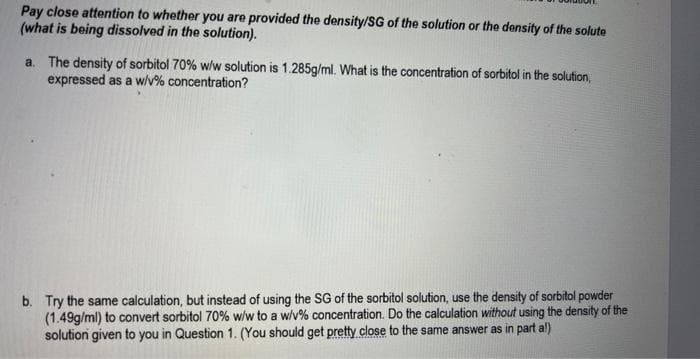a. The density of sorbitol 70% w/w solution is 1.285g/ml. What is the concentration of sorbitol in the solution, expressed as a w/v% concentration? b. Try the same calculation, but instead of using the SG of the sorbitol solution, use the density of sorbitol powder (1.49g/ml) to convert sorbitol 70% w/w to a w/v% concentration. Do the calculation without using the density of the solution given to you in Question 1. (You should get pretty close to the same answer as in part al)
a. The density of sorbitol 70% w/w solution is 1.285g/ml. What is the concentration of sorbitol in the solution, expressed as a w/v% concentration? b. Try the same calculation, but instead of using the SG of the sorbitol solution, use the density of sorbitol powder (1.49g/ml) to convert sorbitol 70% w/w to a w/v% concentration. Do the calculation without using the density of the solution given to you in Question 1. (You should get pretty close to the same answer as in part al)
Chemistry
10th Edition
ISBN:9781305957404
Author:Steven S. Zumdahl, Susan A. Zumdahl, Donald J. DeCoste
Publisher:Steven S. Zumdahl, Susan A. Zumdahl, Donald J. DeCoste
Chapter1: Chemical Foundations
Section: Chapter Questions
Problem 1RQ: Define and explain the differences between the following terms. a. law and theory b. theory and...
Related questions
Question

Transcribed Image Text:Pay close attention to whether you are provided the density/SG of the solution or the density of the solute
(what is being dissolved in the solution).
a. The density of sorbitol 70% w/w solution is 1.285g/ml. What is the concentration of sorbitol in the solution,
expressed as a w/v% concentration?
b. Try the same calculation, but instead of using the SG of the sorbitol solution, use the density of sorbitol powder
(1.49g/ml) to convert sorbitol 70% w/w to a w/v% concentration. Do the calculation without using the density of the
solution given to you in Question 1. (You should get pretty close to the same answer as in part a!)
Expert Solution
This question has been solved!
Explore an expertly crafted, step-by-step solution for a thorough understanding of key concepts.
This is a popular solution!
Trending now
This is a popular solution!
Step by step
Solved in 4 steps

Knowledge Booster
Learn more about
Need a deep-dive on the concept behind this application? Look no further. Learn more about this topic, chemistry and related others by exploring similar questions and additional content below.Recommended textbooks for you

Chemistry
Chemistry
ISBN:
9781305957404
Author:
Steven S. Zumdahl, Susan A. Zumdahl, Donald J. DeCoste
Publisher:
Cengage Learning

Chemistry
Chemistry
ISBN:
9781259911156
Author:
Raymond Chang Dr., Jason Overby Professor
Publisher:
McGraw-Hill Education

Principles of Instrumental Analysis
Chemistry
ISBN:
9781305577213
Author:
Douglas A. Skoog, F. James Holler, Stanley R. Crouch
Publisher:
Cengage Learning

Chemistry
Chemistry
ISBN:
9781305957404
Author:
Steven S. Zumdahl, Susan A. Zumdahl, Donald J. DeCoste
Publisher:
Cengage Learning

Chemistry
Chemistry
ISBN:
9781259911156
Author:
Raymond Chang Dr., Jason Overby Professor
Publisher:
McGraw-Hill Education

Principles of Instrumental Analysis
Chemistry
ISBN:
9781305577213
Author:
Douglas A. Skoog, F. James Holler, Stanley R. Crouch
Publisher:
Cengage Learning

Organic Chemistry
Chemistry
ISBN:
9780078021558
Author:
Janice Gorzynski Smith Dr.
Publisher:
McGraw-Hill Education

Chemistry: Principles and Reactions
Chemistry
ISBN:
9781305079373
Author:
William L. Masterton, Cecile N. Hurley
Publisher:
Cengage Learning

Elementary Principles of Chemical Processes, Bind…
Chemistry
ISBN:
9781118431221
Author:
Richard M. Felder, Ronald W. Rousseau, Lisa G. Bullard
Publisher:
WILEY